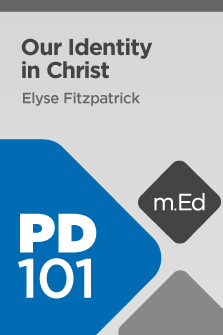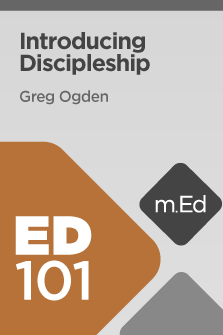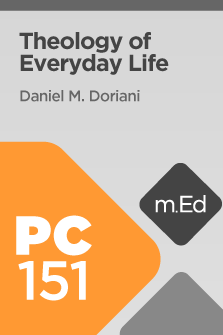Discipleship and Spiritual Formation: Cornerstone Study Bundle
Examine the implications of our identity in Christ, what it means to be a disciple, and how theology can inform social and personal life.

30-day money-back guarantee

No prior coursework required

Learn in community
Your Cornerstone Study of Spiritual Formation
In these cornerstone courses, you will learn how to cultivate a Christ-centered
identity and grow in your understanding of the Word, theology, and discipleship.
Courses - Cornerstone

PD101 Our Identity in Christ
Published: 2014
Video Hours: 2
Grow your identity in Christ further with this course from renowned author and biblical counselor Elyse Fitzpatrick. God has the power to transform lives through his love. In this course, learn what the Bible says about our identity in Christ, including how we are chosen, justified, adopted, and delivered from darkness. Then examine the implications of our identity in Christ, including what we can believe about ourselves, how we can respond to others, and where we can place our hope. Whether you’re a counselor, a pastor, or a new Christian, Elyse Fitzpatrick’s lessons will be foundational for helping you cultivate a Christ-centered identity.

Professor:
Elyse Fitzpatrick
MA, Trinity Theological Seminary; CCEF Certificate, Biblical Counseling

ED101 Introducing Discipleship
Published: 2014
Video Hours: 8
Dr. Greg Ogden examines what it means to be a disciple and how disciple-making can occur in the church context. In three major sections, the course considers the Church’s missional mandate and core theological challenges to carrying it out, biblical models of disciple-making as seen in the ministries of Jesus and Paul, and the application of disciple-making models in the context of the local church.

Professor:
Dr. Greg Ogden
DMin, Fuller Theological Seminary

PC151 Theology of Everyday Life
Published: 2014
Video Hours: 5
In Theology of Everyday Life, Dr. Daniel Doriani shows how theology can inform social and personal life. From eating and playing to friendship and weddings, this course looks at the importance of developing a deeper sense of the relevance of Scripture and Christian ethics to physical and relational life. Reflecting deeply on what the Bible has to say about various everyday topics, Doriani gives rich ethical guidance and provides tools to help you find insight from Scripture.

Professor:
Dr. Daniel Doriani
STM Yale University; PhD, Westminster Seminary
Syllabus & Learning Outcomes
PD101 Our Identity in Christ
Our Identity in Christ (PD101) demonstrates that God’s love has the power to transform the life of Christians who understand his work on their behalf. The first section of the course examines what the Bible says about our identity in Christ, including how we are chosen, justified, adopted, and delivered from darkness. The second section discusses the implications of our identity in Christ, including what we can believe about ourselves, how we can respond to others, and where we can place our hope.
ED101 Introducing Discipleship
Introducing Discipleship (ED101) examines what it means to be a disciple and how disciple-making can occur in the church context. In three major sections, the course considers the Church’s missional mandate and some core theological challenges to carrying it out, biblical models of disciple-making as seen in the ministries of Jesus and Paul, and the application of disciple-making models in the context of the local church.
PC151 Theology of Everyday Life
Theology of Everyday Life (PC151) shows how theology can inform social and personal life. From eating and playing to friendship and weddings, this course looks at the importance of developing a deeper sense of the relevance of Scripture and Christian ethics to physical and relational life. Reflecting deeply on what the Bible has to say about various everyday topics, it points students toward rich ethical guidance and provides tools to help people find insight from Scripture for all of life.
Learning Outcomes
- Identify the truths of the gospel with respect to a believer’s identity
- Discuss the implications of a Christian’s identity in Christ
- Articulate ways in which the gospel can transform believers’ views of themselves
- Describe how the gospel can affect believers’ response to other people
- Define the Church’s mission and explain how the Church has approached the task of accomplishing that mission during various eras of Church history
- Discuss the theological challenges of accomplishing the mission of the Church
- Describe the models of discipleship evident in the lives of Jesus and Paul
- Explain how these models can be applied in the context of the local church
- Discuss the need for a theology of everyday life in light of social pressure
- Give a cultural analysis and a theological response on a given issue
- Examine the hermeneutics of Jesus and apply it to your own study of Scripture
- Explore the significance of Scripture on a variety of social and personal areas of living
- Apply the “creation-fall-redemption-restoration” paradigm to a variety of issues
- Begin to form your own theology of everyday life